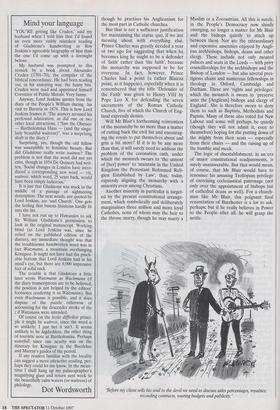Mind your language
'YOU'RE getting like Cruden,' said my husband when I told him that I'd found an even more risibly mistaken reading of Gladstone's handwriting in Roy Jenkins's agreeable biography of him than the one I'd come up with a fortnight before.
My husband was prompted to this remark by a book about Alexander Cruden (1701-70), the compiler of the biblical concordance. He had been reading out, in his annoying way, the funny bits. Cruden went mad and appointed himself Corrector of Public Morals. Very funny.
Anyway, Lord Jenkins quotes from the diary of the People's William during his visit to Bavaria in 1874. This is how Lord Jenkins frames it: 'The scenery aroused his profound admiration, as did one or two other local attractions. ("Saw the Obersee — Bartholomaus Haus — (and the singu- larly beautiful waitress)", was a surprising shaft in the diary.)' Surprising, yes, though the old fellow was susceptible to feminine beauty. But did Gladstone really write waitress? The problem is not that the word did not yet exist, though in 1854 De Quincey had writ- ten, 'Social changes in London have intro- duced a corresponding new word — viz, waitress, which word, 25 years back, would have been simply ludicrous.'
It is just that Gladstone was stuck in the middle of a passage of sightseeing description. The next words, not quoted by Lord Jenkins, are 'and Church'. One gets the feeling that buxom frauleins hardly fit into the list.
I have not run up to Hawarden to ask Sir William Gladstone's permission to look at the original manuscript. Working blind (as Lord Jenkins was, since he relied on the published edition of the diaries), my immediate thought was that the troublesome handwritten word was in fact Watzmann, a mountain overhanging Konigsee. It might not have had the pinch- able bottom that Lord Jenkins had in his mind's eye, but there are 8,900 impressive feet of solid rock.
The trouble is that Gladstone a little later wrote Watzmann as Wachmann (if the diary transcriptions are to be believed; the position is not helped by the editors' footnotes rendering it as Walzmann). But even Wachmann is possible, and it does dispose of the puzzle otherwise of accounting for the descender stroke of the z if Watzmann were intended.
Of course on the lectio difficilior princi- ple it might be waitress, since the word is so unlikely; I just bet it isn't. It seems unlikely to be Jagdschloss, the other thing of touristic note at Bartholomau. Perhaps waterfall, since one nearby was on the itinerary for Konigsee in the Baedeker and Murray's guides of the period.
If any readers familiar with the locality can suggest a more attractive reading, per- haps they could let me know. In the mean- time I shall hang up my palaeographer's magnifying glass and return next week to the beautifully calm waters (or waitress) of philology.
Dot Wordsworth


















































































 Previous page
Previous page